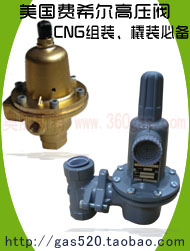位置:首页 > 燃气资讯 > CNG Station Networ
CNG Station Network Planned for Attica, Greece
浏览次数 882 , 日期 2014-12-22 , 燃气设备 加入收藏
Italian technology and engineering company CTIP Oil & Gas SRL has presented an investment plan for the development of a Compressed Natural Gas (CNG) network in Greece, aimed primarily at the truck and bus sector. The proposal will focus on Attica, the region surrounding the capital city of Athens, and will unfold over five years at a cost of EUR 200 million (USD 250 m).美国FISHER费希尔 HSR-CDHBLYN煤气减压阀,天然气低压阀
CTIP’s president and CEO Reda Ginena explained that changes are required to the legal framework to permit the use of CNG as a fuel for transportation. DEPA S.A., the Natural Gas Corporation of Greece, in cooperation with TÜV Saarland achieved the establishment of new legislation referring to the specifications, installation, operation, maintenance and licensing of CNG stations, passed by the Greek Parliament in 2013 and implemented early 2014.
DEPA, in an attempt to open the way for natural gas mobility, is cooperating with Hellenic Petroleum develop new refueling stations in Larissa and Volos, in addition to the five stations that are already operating in Athens and Thessaloniki, reported ‘EnergyWorld’ in September. Already there are buses, waste collection vehicles, taxis and private cars taking advantage of the economy of CNG. In 2009, the city of Athens deployed 108 Mercedes-Benz Econic NGT urban waste disposal vehicles.
Expanding the use of natural gas has emerged as a high priority issue on official body agendas in Greece. The publication of the Ministerial Decision for conversion of oil-based engines to bi-fuel operations (CNG and petrol/diesel) is expected in January 2015, subject to the passing of the bill introduced in the House by the Ministry of Transport and Communications Networks, reports Greek news service ‘TheTOC’.
CTIP is reported by Greece’s ‘energypress’ to be actively engaged with the Greek government, fleet operators and maintainers, and potential station suppliers, to plan the introduction of the fuel. Based on current prices, CNG is 50 percent cheaper than petrol and 30-40 percent cheaper than diesel. Furthermore, Ginena added, this cost advantage means the cost incurred from CNG vehicle conversion can be quickly recovered in four to eight months, depending on distance traveled.
Investment plans may also expand to include natural gas fuel for transportation on many of Greece’s islands rich in heritage and subject to environmental pollution, taking advantage of natural gas’s lower emissions and quieter engine noise.
CTIP’s president and CEO Reda Ginena explained that changes are required to the legal framework to permit the use of CNG as a fuel for transportation. DEPA S.A., the Natural Gas Corporation of Greece, in cooperation with TÜV Saarland achieved the establishment of new legislation referring to the specifications, installation, operation, maintenance and licensing of CNG stations, passed by the Greek Parliament in 2013 and implemented early 2014.
DEPA, in an attempt to open the way for natural gas mobility, is cooperating with Hellenic Petroleum develop new refueling stations in Larissa and Volos, in addition to the five stations that are already operating in Athens and Thessaloniki, reported ‘EnergyWorld’ in September. Already there are buses, waste collection vehicles, taxis and private cars taking advantage of the economy of CNG. In 2009, the city of Athens deployed 108 Mercedes-Benz Econic NGT urban waste disposal vehicles.
Expanding the use of natural gas has emerged as a high priority issue on official body agendas in Greece. The publication of the Ministerial Decision for conversion of oil-based engines to bi-fuel operations (CNG and petrol/diesel) is expected in January 2015, subject to the passing of the bill introduced in the House by the Ministry of Transport and Communications Networks, reports Greek news service ‘TheTOC’.
CTIP is reported by Greece’s ‘energypress’ to be actively engaged with the Greek government, fleet operators and maintainers, and potential station suppliers, to plan the introduction of the fuel. Based on current prices, CNG is 50 percent cheaper than petrol and 30-40 percent cheaper than diesel. Furthermore, Ginena added, this cost advantage means the cost incurred from CNG vehicle conversion can be quickly recovered in four to eight months, depending on distance traveled.
Investment plans may also expand to include natural gas fuel for transportation on many of Greece’s islands rich in heritage and subject to environmental pollution, taking advantage of natural gas’s lower emissions and quieter engine noise.








